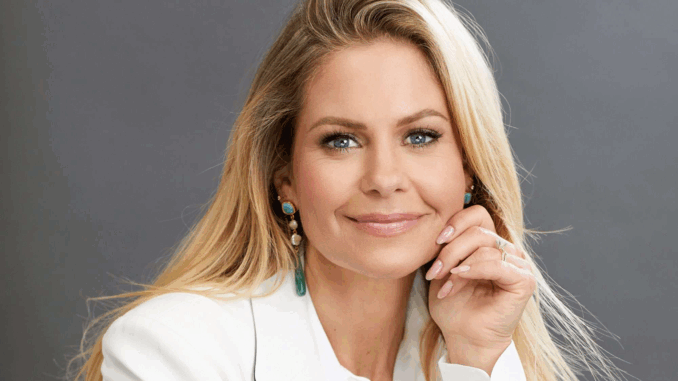
When Candace Cameron Bure first appeared on television screens as Donna Jo “D.J.” Tanner in Full House, few could have predicted that she would become one of the most recognizable faces of wholesome American entertainment. Over the decades, Candace’s career has evolved alongside her personal life — shaped by motherhood, faith, controversy, and the challenge of maintaining authenticity in an industry that rarely rewards it.
Growing Up on Camera
Born in 1976 in Los Angeles, Candace was destined for television. Her older brother, actor Kirk Cameron, was already a household name by the time she entered the business. When she landed the role of D.J. Tanner at just eleven, her childhood instantly merged with celebrity. Full House wasn’t just a hit sitcom — it was a cultural phenomenon. Audiences tuned in every Friday night to watch the Tanner family navigate life’s moral lessons with humor and love, and D.J. quickly became a fan favorite.
But being the eldest child both on screen and off came with pressure. Candace often spoke about the unique experience of spending her formative years surrounded by cameras, adults, and professional expectations. When Full House ended in 1995, she was only nineteen — an adult by legal standards, but one who had spent her adolescence in a fictional family more than in her real one.
Finding Purpose Beyond Hollywood
After the show’s finale, Candace made a deliberate choice: instead of chasing her next role, she stepped back. In 1996, she married Valeri Bure, a professional hockey player from Russia. Together, they built a family centered on values rather than fame, raising three children largely out of the spotlight.
Motherhood transformed Candace. It also anchored her in faith. She became an outspoken Christian, often saying that her beliefs helped her navigate the turbulence of Hollywood. Over the years, this commitment to faith became her brand — one that would both define and divide public perception of her.
The Return to Television
Candace’s return to acting began quietly. She took on projects with family-friendly networks like Hallmark, crafting a career built around feel-good television movies. Her characters — often strong, optimistic women — reflected the values she espoused publicly.
When Netflix revived Full House as Fuller House in 2016, Candace reprised her role as D.J., now a widow raising three sons. The symmetry between her real life and her character’s journey was impossible to miss. She became the heart of the revival, bringing both nostalgia and maturity to the role that had launched her career.
Controversy and Conviction
Candace’s open expression of faith hasn’t always been met with applause. She has faced criticism for her conservative views, especially regarding her statements about marriage and traditional values. Yet, she remains steadfast. “I know who I am,” she said in an interview. “I’d rather be true to my beliefs and lose followers than compromise.”
Her stance has made her a polarizing figure — celebrated by many for her authenticity and criticized by others for perceived exclusivity. But Candace views controversy as an inevitable consequence of conviction.
Legacy and Perspective
Through the lens of fame, family, and faith, Candace Cameron Bure’s story is one of alignment — of building a life that mirrors her principles. In an industry notorious for reinvention, she stands as an anomaly: a woman who returned to her roots and found fulfillment in staying the course.
Today, she continues to act, produce, and advocate for wholesome entertainment. Her legacy extends beyond Full House — it’s about resilience, identity, and the enduring strength of personal belief.
